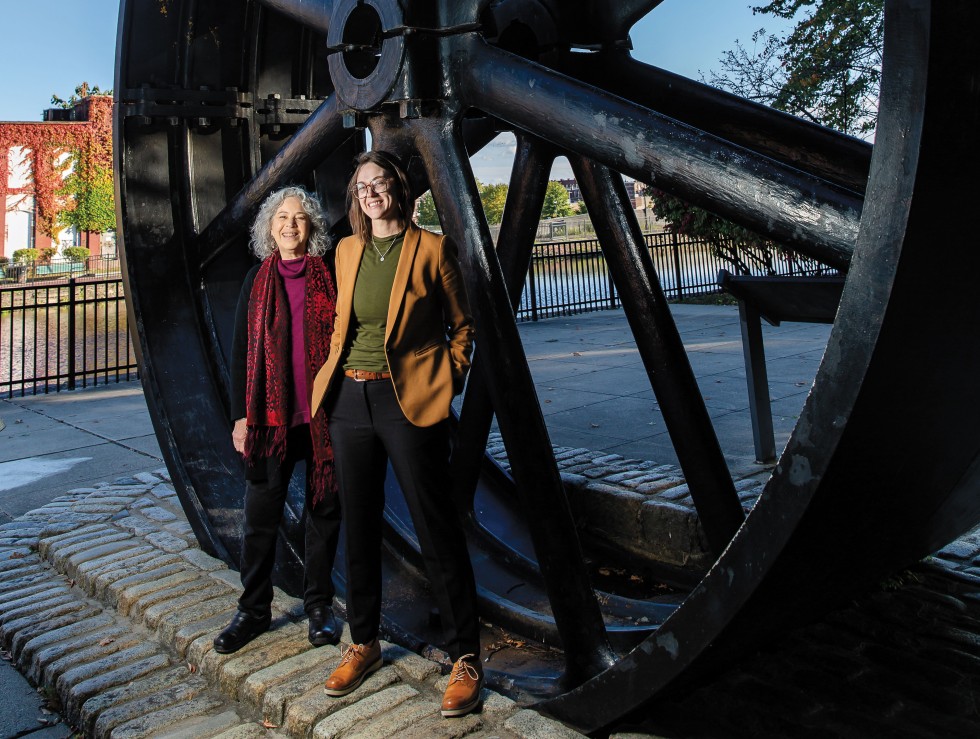Quest for Justice
At the pinnacle of a decades-long career in the Foreign Service, Ambassador Bridget Brink ’91 relies on lessons…
Read The StoryHow Ellen Pader ’72 and Maureen St. Cyr ’04 are working to end housing discrimination in Massachusetts.

In the fall of 2003, Maureen St. Cyr ’04 was sitting in her English honors senior seminar when her instructor, now-Professor Emerita of English Judy Smith, walked into the room holding a newspaper clipping about Coal Run, a predominantly Black neighborhood in nearby Zanesville, Ohio.
Residents of the town had been denied access to public water, forcing the community to collect rainwater or transport water from local cisterns to cook, drink and bathe. The issue struck a chord with St. Cyr, as did the subsequent class discussion.
After graduating, she worked as a paralegal at an Ohio law firm, and in a full-circle moment, she was pulled onto the Zanesville water case. While working on the project, St. Cyr remembers an associate at the firm taking out a map of Zanesville and pointing out the road where the water line stopped. “The dividing line was race.”
“The thing that has always drawn me to the issue of fair housing is that it is so fundamental and it connects to everything,” said St. Cyr. The Fair Housing Act of 1968 prohibits discrimination in access to the services and facilities that are related to housing — water, in the Zanesville case. Thinking back to the civil rights era, when modern fair housing advocacy was in its nascent stages, spurred by Dr. Martin Luther King’s work around the open housing movement in Chicago, she noted that “Connections were being made between economic justice and issues around segregated housing, those basic issues of access to equal housing opportunity.”
St. Cyr later earned a master’s degree from Queens University Belfast and a law degree from the University of Pennsylvania, but fair housing advocacy was always front of mind. Working as an attorney in Massachusetts, she was involved in community legal aid, providing civil legal services and eviction defense.
A decade into her career as a lawyer, she caught wind that the Massachusetts Fair Housing Center (also known as Mass Fair Housing), the oldest fair housing center in the state, was on the lookout for a new executive director. St. Cyr had long admired the center’s innovative approach toward housing issues — addressing the underlying causes of housing disparities and not only the day-to-day issues.
When Ellen Pader ’72, who chaired Mass Fair Housing’s search for a new executive director, was reading through applications, she spotted “Kenyon College” in the education section of St. Cyr’s CV. For Pader, who arrived at Kenyon with the first class of women, the connection was a green flag. “That said to me she was very well-educated. She could write, she could think. In a sense, Kenyon was another letter of reference.”
Pader is an anthropologist with a doctorate from Cambridge University whose research and work on housing discrimination has influenced policy and saved hundreds of people from eviction. She has worked with Mass Fair Housing since the ’90s — she joined the board in 1992 — and, during her decades as a professor at UMass Amherst in the Regional Planning Program and the School of Public Policy. She involved her classes in community service learning projects with Mass Fair Housing, conducting research and testing, and introducing generations of students to fair housing work and its importance for an inclusive democratic society.
During the interview process, the pair hit it off. Their initial conversations spanned a variety of topics, following different lines of inquiry and identifying points of intellectual connection. “We naturally slid from one question to the other,” Pader said, “pulling together everything from art history, religion, sociology, anthropology, our own family histories.”
That sense of conversational depth and mutual curiosity felt, to St. Cyr, deeply reminiscent of her alma mater. “One of the things that, for me, was sort of quintessentially Kenyon was the way that I learned about the importance of storytelling and narrative to meaning-making. And I think that is central to a lot of people’s experiences there. What does it mean to tell our stories? What does it mean to be people in this world and in a community?”
Those questions are directly relevant to the work of Mass Fair Housing, which strives to be directed by the community it’s serving, rather than directing and making decisions on behalf of the community.
Early in the interview process, Pader remembers a colleague noting St. Cyr’s ability to think outside of the box to reframe her work in a fresh way that nonetheless made total legal sense. That sense of ingenuity, paired with passion and a career built on fair housing advocacy, got her the job. “She’s phenomenal,” said Pader.
In a way, for St. Cyr, it all goes back to Professor Smith, whose teachings on memoir and self-narration have deeply shaped her professional experience. In that senior seminar, “We talked about what we owe to each other,” St. Cyr remembered. “You have to sit with how different people are approaching the truth and how different people are approaching meaning, and how are we creating it as a community, together?”
At the pinnacle of a decades-long career in the Foreign Service, Ambassador Bridget Brink ’91 relies on lessons…
Read The StoryExamining the impact — and work left to do — after the record-breaking Our Path Forward to the Bicentennial…
Read The StoryA front-row seat to learn from fellow alumni what it was like to be in their shoes for some unforgettable experiences…
Read The Story